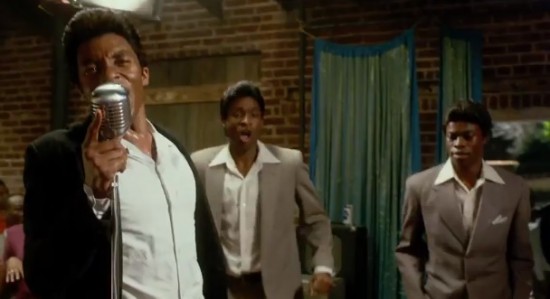Get On Up does two things magnificently well, and they’re related: It conveys the batshit craziness of both James Brown and Little Richard, which is quite a feat and aided in no small part from Chadwick Boseman as Brown and Brandon Mychal Smith as Richard. The two give performances so captivating that it’s worth seeing the film simply to indulge in their fascinating performances.
That Get On Up would be well acted is probably no surprise, but it is a surprise that they can almost carry the entire 138-minute film. Almost. And that the music is phenomenal shouldn’t be a surprise either. I’m not sure if Boseman performed all the songs, but I’m fairly certain he did his own dancing, and both are wisely indulgent, wisely for this film, which at least does know how to put on a show.
Director Tate Taylor (The Help) and writers Jez and John-Henry Butterworth nail many of the character moments, but never quite get around to understanding their subject. The first thirty minutes or so jumps back and forth through so many different periods that if there’s a linear story buried in there, I missed it. Even more, if there’s something that “made” Brown the man he became, the film doesn’t seem very interested in it, which would be fine, but it does need some kind of connecting thread to tie the movie together.
That said, from the flurry of scenes we do get, the best are those not really connected to Brown’s music — specifically I mean one sequence where Brown (or perhaps it’s Richard — it’s not entirely clear, but who cares?), as a very small child, is forced to box other similarly small children for the amusement of a gaggle of white country-clubbers. The point may be too on the nose, but the concluding image of Brown raising his arm victoriously and mirroring the Statue of Liberty’s pose is a visual metaphor that few films anywhere could pull off.
But despite some big strengths, I still can’t quite recommend it. For as many times it hits its target, it misses. For example, often Boseman will turn to directly address the camera, usually to share his inner thoughts or drag the audience in on a joke. I guess this is a flourish that has its place somewhere, but not in a film that wants to treat its subject as a strange and beautiful enigma.
The subplot (or is it the main plot?) concerning Brown’s relationship with his mother suffers from awkward editing in giving us a critical moment far too late for it to have any significance. For that matter Brown’s relationship with his wife screams of complexity but is treated as something there out of necessity — we need to put it in, so let’s just get it out of the way — except for one moment that’s so abrupt and unearned that it feels a bit callous.
In all, it’s a biopic that thankfully does take some chances, but will likely leave you with no greater understanding of Brown than you had going in, which I don’t think is the point. Still, while it may not be the definitive James Brown biopic, it may well be the definitive performance.


getthefunk
August 3, 2014 at 11:10 pmYou missed many, many points in this movie. There was no need to do the long, drawn out life story in chronological time. As the script unfolded, the audience was taken back to relevant events to give some foundation. And I don’t know what movie you were watching, but it was clear Mr. Brown had more than one wife. As for the “screaming of complexity” … well, you again missed the point. Dealing with the domestic violence was important to not sugarcoat the man James Brown was. The movie did an excellent job of giving the audience the essence of the genious of James Brown and the environment and life events that shaped him as a man… the whole man.
moviegoer
August 3, 2014 at 7:24 pmI think you totally missed the point.
This movie was & is great entertainment
music wise & some history wise of being a black entertainer at that time.
Any more then the movie is heavy.
Just enjoy the music & paid respect to the Godfather of soul…no more